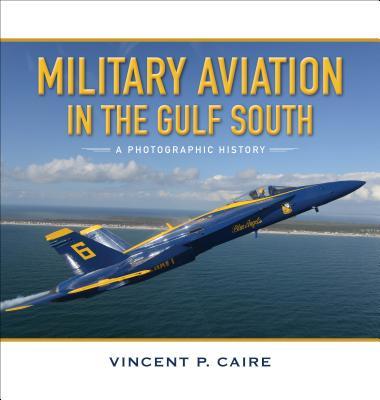In 1914, the U.S. Navy established its first air station in Pensacola, Florida. Two years later, the U.S. Army, after training its pilots in the skies of Texas, conducted its first combat flights. In the decades that followed and through World War II, the Gulf South welcomed over two hundred air bases and Naval air stations. By the close of the twentieth century these installations had fostered critical advances in pilot training, producing many of the most acclaimed military personnel to take to the skies. Vincent P. Caire's authoritative and inspiring photographic survey recognizes Gulf South aviation heroes like Brig. Gen. Claire Chennault and honors the role of key southern military air facilities like Eglin and Maxwell Air Force bases.
For more than a hundred years, the Gulf South--defined here as Florida, Georgia, Alabama, Mississippi, Louisiana, and Texas--has supported advancement in every branch of military aviation, contributing both technical prowess and fearless pilots to U.S. forces. Through many never-before-published photographs and an informative text, Military Aviation in the Gulf South celebrates these achievements, including the massive expansion of aviation in World War II, establishment of training facilities for officers--including Hollywood stars and the Tuskegee airmen--and commissioning of the U.S. Navy's Blue Angels flight demonstration squadron. Caire's comprehensive history also highlights innovation--such as the designs of Lt. Harold L. Clark for Randolph Air Force Base--and sacrifice, like that of World War I pilot 2nd Lt. Samuel Keesler, the namesake of the Biloxi, Mississippi, base. For generations of servicemen and women, their families, and the local civilian communities that support them, Military Aviation in the Gulf South pays tribute to the enduring impact of the region's aviation programs on America's security and the defense of freedom worldwide.
Military Aviation in the Gulf South: A Photographic History
In 1914, the U.S. Navy established its first air station in Pensacola, Florida. Two years later, the U.S. Army, after training its pilots in the skies of Texas, conducted its first combat flights. In the decades that followed and through World War II, the Gulf South welcomed over two hundred air bases and Naval air stations. By the close of the twentieth century these installations had fostered critical advances in pilot training, producing many of the most acclaimed military personnel to take to the skies. Vincent P. Caire's authoritative and inspiring photographic survey recognizes Gulf South aviation heroes like Brig. Gen. Claire Chennault and honors the role of key southern military air facilities like Eglin and Maxwell Air Force bases.
For more than a hundred years, the Gulf South--defined here as Florida, Georgia, Alabama, Mississippi, Louisiana, and Texas--has supported advancement in every branch of military aviation, contributing both technical prowess and fearless pilots to U.S. forces. Through many never-before-published photographs and an informative text, Military Aviation in the Gulf South celebrates these achievements, including the massive expansion of aviation in World War II, establishment of training facilities for officers--including Hollywood stars and the Tuskegee airmen--and commissioning of the U.S. Navy's Blue Angels flight demonstration squadron. Caire's comprehensive history also highlights innovation--such as the designs of Lt. Harold L. Clark for Randolph Air Force Base--and sacrifice, like that of World War I pilot 2nd Lt. Samuel Keesler, the namesake of the Biloxi, Mississippi, base. For generations of servicemen and women, their families, and the local civilian communities that support them, Military Aviation in the Gulf South pays tribute to the enduring impact of the region's aviation programs on America's security and the defense of freedom worldwide.